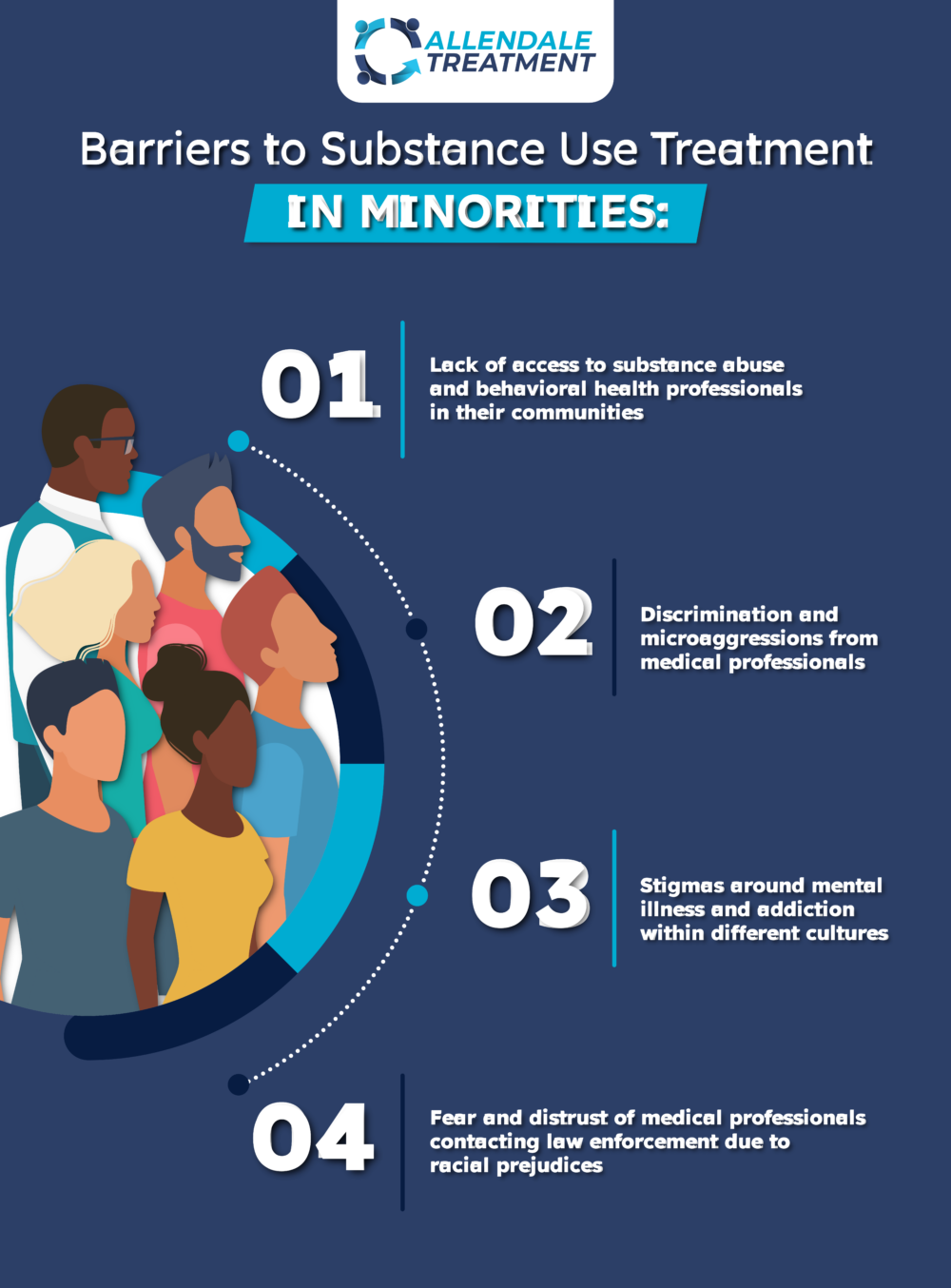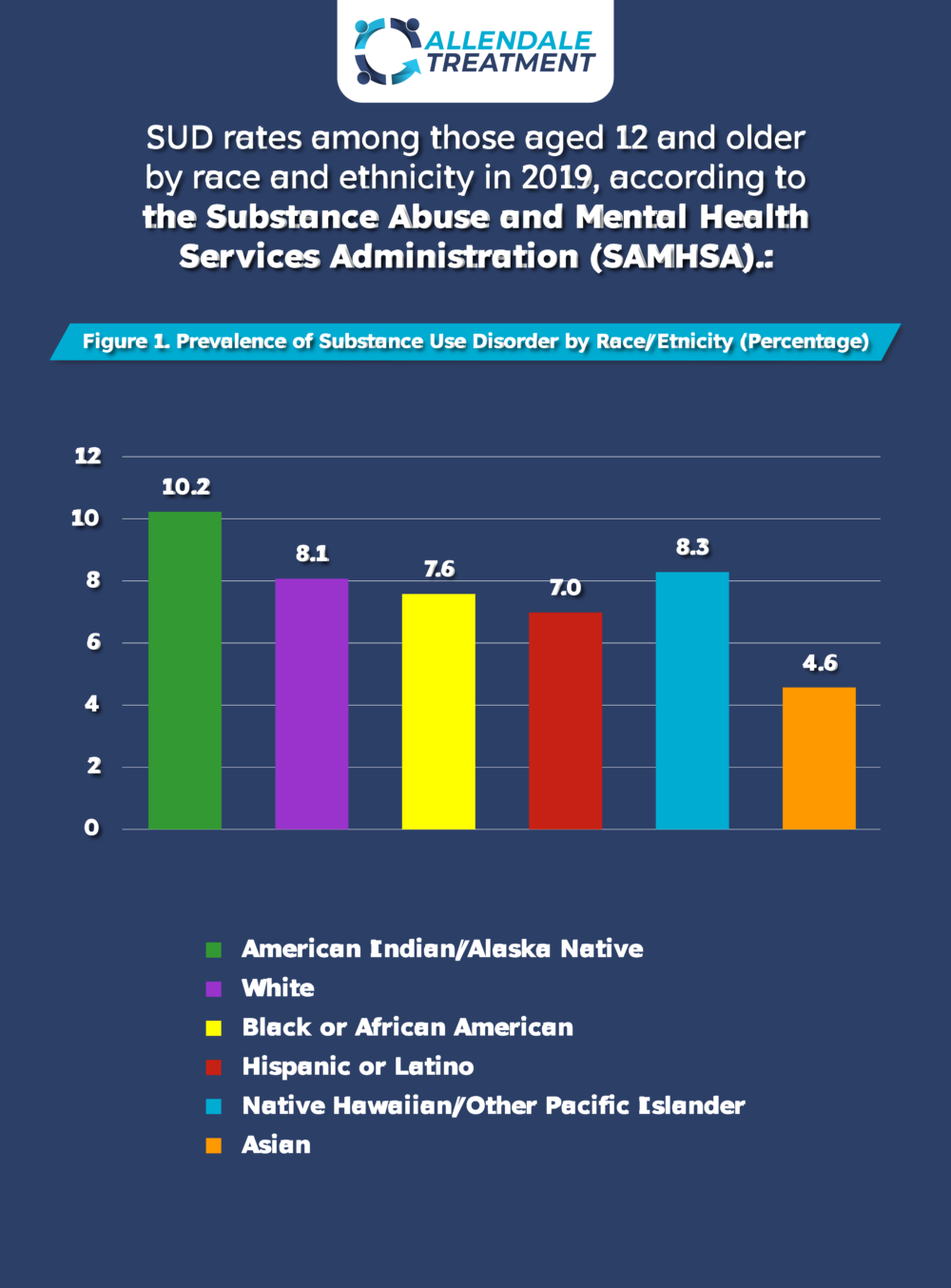RACIAL DISCRIMINATION PREVALENT FOR MINORITIES WITH SUBSTANCE USE DISORDERS
RACIAL DISCRIMINATION PREVALENT FOR MINORITIES WITH SUBSTANCE USE DISORDERS
According to the 2020 U.S. Census, about 42% of the population belongs to a racial or ethnic minority group. Unfortunately, racial disparities in substance abuse treatment are prevalent in both accessibility and quality of care.
Updated: 2023
Written by: Allendale Treatment
If you or anyone you know are struggling with addiction, call (833) 338-6946 to speak with a professional.
For example, 90% of Black and 92% of Latinx groups were diagnosed with substance use disorders (SUD) but did not receive any kind of addiction treatment. The reasons why many minority groups may hesitate to seek treatment are complex and rooted in systemic racism in the healthcare industry, fear of legal consequences and a lack of community resources.
Substance Use Disorders on the Rise Among Minority Groups
The opioid crisis has claimed thousands of lives over the past few years but it’s been particularly hard on certain minority groups. In the past 5 years, 43% of Black Americans have experienced an opioid-related death compared to 22% of Caucasian Americans.
According to the Substance Abuse and Mental Health Services Administration (SAMHSA), in 2017, Black individuals had the highest rates of opioid and synthetic opioid-related overdose fatalities compared to other racial and ethnic groups. In the same year, American Indians and Alaska Natives had the second-highest rate of opioid overdoses and the third-highest rate of overdose deaths from synthetic opioids.
Despite these alarming numbers, these same minority groups were also seeking out treatment at a lower rate. Data from the 2019 National Survey on Drug Use and Health (NSDUH) shows that while 2.8 million White Americans reported receiving substance use treatment in the previous year only 468,000 African Americans, 27,000 American Indian & Alaska Natives and 448,000 Hispanics or Latinos said they had sought out treatment.
This data wasn’t surprising for addiction psychologists and health inequities experts like Christina Lee. “If you can’t speak English, you’re treated differently,” says Lee. “If you’re not what people expect, if you have a certain skin color, a darker color if you don’t look like your treatment provider, it’s a harder road. That’s what I observed when I started my career as a substance use treatment counselor.”
Mental Health Stigma Harder for Minorities
According to the American Society of Addiction Medicine (ASAM), racism and discrimination increase the likelihood of minorities developing a SUD. Limited access to mental health treatment for conditions such as trauma, depression and anxiety makes people of color more vulnerable to developing a SUD as a coping mechanism. Despite this, a 2020 report showed that minorities were generally less likely to report experiencing any mental illness or substance use disorders compared to their White peers. 64% of White adults with co-occurring disorders indicated they received treatment for a substance use disorder, mental illness, or both in the past year. In comparison, only 47% of Black and 43% of Hispanic adults with co-occurring disorders said they received treatment.
Emily Einstein, Ph.D., the chief of Science Policy at the National Institute on Drug Abuse (NIDA) and co-lead of the NIDA Racial Equity Initiative, says that many minorities are afraid to seek treatment for behavioral health issues or SUDs due to the stigma and potential consequences they face. “There is a history of racial bias and discrimination around drug use in this country,” says Einstein. “Who is considered a ‘patient’ and who is considered a ‘criminal’ is a fraught societal issue that plays out in doctor’s offices, emergency departments, hospitals, courtrooms, prisons, and beyond.”
Minorities have also struggled more with their mental health during the pandemic according to KFF survey data which is another contributing factor to the increase in SUDs. Compared to their Caucasian peers, they have lost more family members and friends to COVID, faced greater financial challenges and have struggled more with finding childcare and securing the right resources for virtual schooling.

Inequalities In Addiction Treatment
In communities with a history of high substance abuse, opportunities to identify SUDs in minorities are still falling through the cracks. A 2018 study by Venner, and a group of family physicians in New Mexico serving primarily Latino, Hispanic and Native American communities, found that only 25% of clinicians screened patients for drug and alcohol use at every visit missing key screening opportunities.
Even when they are properly diagnosed and seek care, minorities often face challenges accessing addiction treatment. They may face language barriers with providers which can delay their admittance to a detox center, have limited information about the types of rehabilitation treatment facilities available to them and face hurdles in accessing medication-assisted treatment (MAT) for opioid use disorder (MOUD). One study showed that Black patients were 70% less likely to receive a prescription for buprenorphine or other MATs compared to white patients. In another study, Black patients were half as likely to obtain follow-up treatment through filled prescriptions for buprenorphine or naltrexone and Latinx patients were also less likely to receive follow-up treatment.
Aaron Williams, senior director of Practice Improvement & Consulting with the National Council for Mental Wellbeing, says that abstinence-based treatments shouldn’t be the only option for minorities. “Addiction treatment is viewed by many as a car wash, you go into treatment, get clean and come out, says Williams. “It is not viewed as a chronic condition needing long-term support medication. There are layers of stigma around addiction and treatment medications. Our country has historically focused on abstinence-based treatment which adds to barriers toward MOUD treatment acceptance by patients, clinicians, and communities.”
Experts say that the easiest way to ensure that minorities have access to a high level of care is to partner with local organizations and leaders in their communities to increase trust and decrease the stigma around SUD treatment. Individuals from racial and ethnic minority communities require treatment that is responsive to their cultural, behavioral health and social needs to be effective. This leads to better patient outcomes and also increases the chance that they will complete treatment.

If you or anyone you know are struggling with addiction, call (833) 338-6946 to speak with a professional.


